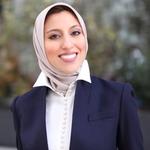Hijabi of the Month November - Dr. Marwa Azab
Lifestyle
|
Nov 16, 2015
|
6 MIN READ
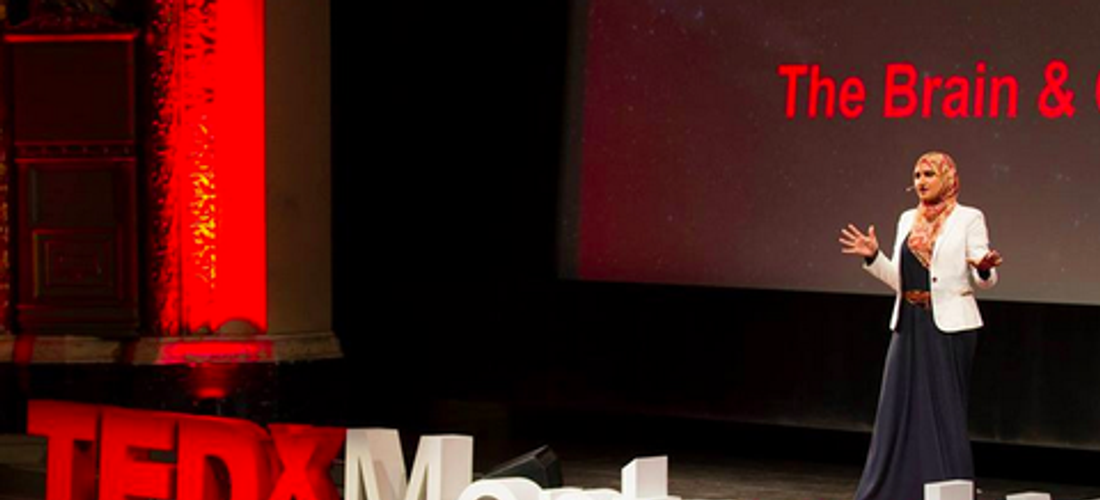
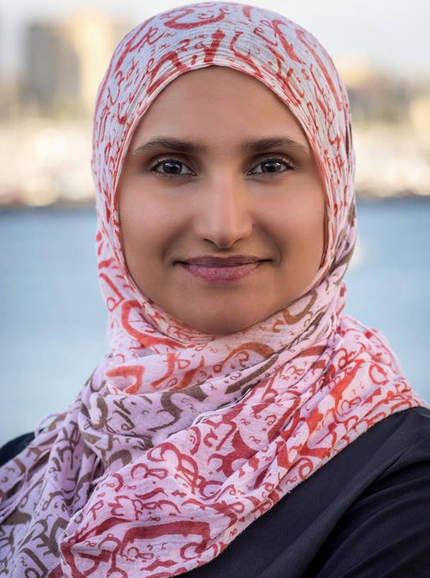
You can follow Marwa on Facebook here and here. You can also read her Huffington Post articles, watch her TED talk or listen to her lecture from this years' ISNA. Also, be sure to check out her free webinar on depression here.
1) When did you start wearing hijab? Tell us a little about your journey.
I started wearing the hijab on October 27th, 2006. I was applying for my PhD which required an in-person interview. So, I went in to the interview in my hijab, and alhamdulilah got accepted. I had always rationalized why it would be difficult for me to wear hijab; I am a professional, constantly in the public domain... I had 1,000 other excuses. Then, I met a fellow professional who told me that she was me a few years ago, and that she felt so ugly wearing it. But, she made duaa in Ramadan, and it was accepted. Then came Ramadan 2006, and I made duaa; I made duaa on laylatul Qadr. I did not have any hijab-friendly clothing in my closet. So, I woke up one morning and decided that is it, "I am putting it on with whatever hijab incompatible clothing I had."
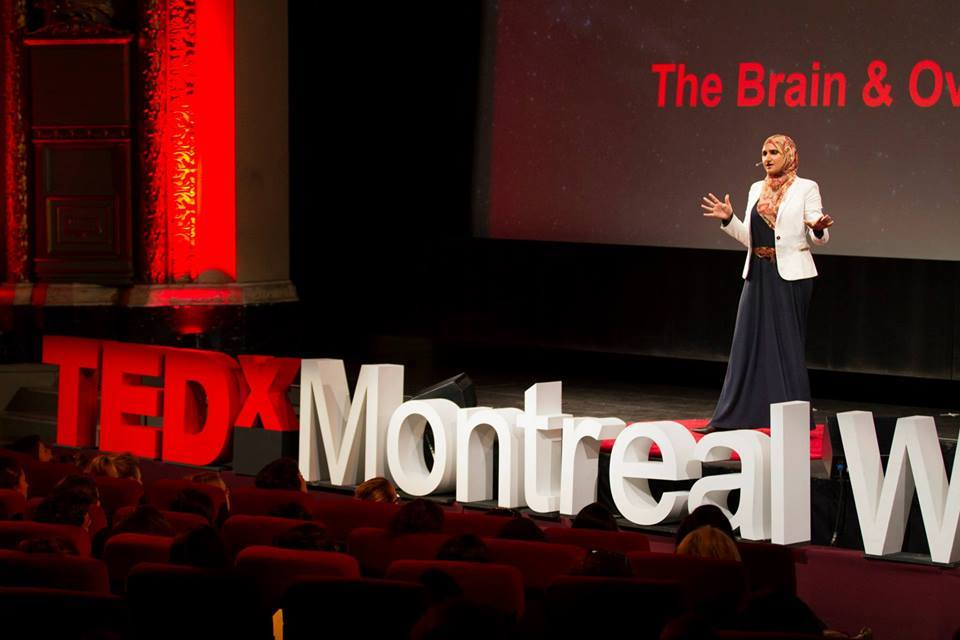
A few months later, I was assured by my doctor that I had ovarian cancer. Instead of being sad, I thought, "Yessss, I put on my hijab, because Allah (SWT) answered my prayer. I did not put it on, because I might have cancer and die, and I was scared to meet Him. I put it on out of love for my Lord and not out of fear." September 2007, I had the surgery, and alhamdulilah, it was benign. I remember I would walk and kiss my hijab. Only with my hijab on did I feel equal to my male colleagues. My ideas were assessed a la cart, not because of my short skirt or how my behind looked in tight jeans. I felt like a valuable human being. I felt in control of where, when and with whom to share my femininity. Hijab covered my head but exposed my brain. May Allah bless all my sisters with this amazing fulfilling feeling and may Allah calibrate our hearts to a constant state of Iman.
2) You were invited to speak at TED x MontrealWomen - tell us what the experience was like and what the biggest takeaway was for you from the event.
It was an amazing experience to realize that women regardless of their faith, career choices and color share the same struggles. The most rewarding element for me was that I was invited as a speaker on science and not hijab or Islam. May Allah (S) reward all the sisters who do speak on hijab and Islam (we desperately need them), and I do too. But, we have very intelligent visibly Muslim women who can speak on a variety of subjects. Lack of representation on stage to address topics not related to faith/Muslim world politics is a form of discrimination.On a different note, the TEDx organizer reached out to me a few weeks before the event to check whether the script of another speaker was offensive to me. The other speaker was a lawyer and comedian and included jokes about niqab. So, I said indeed the script was offensive, and that at minimum I wanted her to speak way after me so that the audience pays attention to my important scientific message and not to my irrelevant clothing. Well, the organizers decided to eliminate the other speaker and keep me on!
3) You spoke about the brain and ovarian hormones - tell us a little more about your talk and what makes you passionate about this topic? Let's begin with my general philosophy: I personally don’t make a distinction between mind and body, between psychological and biological, and thus have taught in the Psychology, Human Development and Biology departments. Yes, Universities enforce a departmental way to think about human behavior: producing professionals who strictly subscribe to either social or physical sciences. And of course, only the elite get to be even more specialized; gynecologist vs. neurologist vs. gastroenterologist. The more prefixes a society weds with ologist, the more advanced. Which means that each specialist would assess the problem from a myopic perspective. However, recent rebellious efforts in integrative medicine urge professionals to holistically assess an individual. In other words, the individual is more than the sum of his/her internal organs. An unhealthy body gives rise to an unhealthy mind; similarly an emotionally suffocating mind, vomits bodily illnesses, one bodily system after another. It is one thing to teach physical and psychological separately, but it is naive to believe and practice it clinically. Since the TEDxWomen talk was for predominantly a women audience, I chose to apply my general philosophy to ovarian hormonal imbalance.
4) In your opinion, what is the biggest issue plaguing Muslim women today?
We sometimes approach the world with the inner sensation that our hijab is so visible. Hijab should not feel like tight shoes, where you are aware of them all day because of the pain they cause. We need to approach the world with the feeling that our hijab is a body part, it should be invisible to our inner eyes first. I am not naive! I know racism 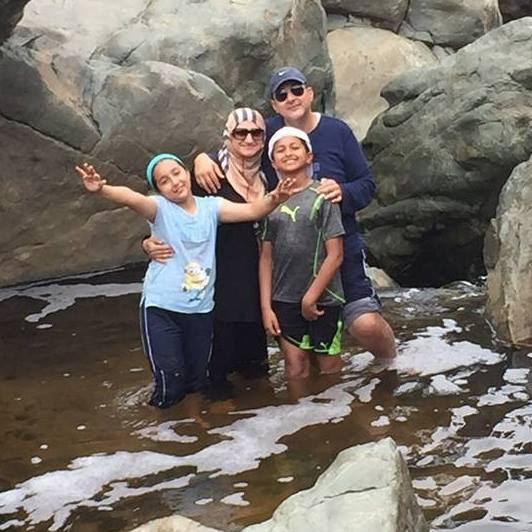 exists and as Muslim women it is double jeopardy for us. But, this makes any accomplishment much more worthy.
exists and as Muslim women it is double jeopardy for us. But, this makes any accomplishment much more worthy.

5) If you could tell your 18 year-old self one thing, what would it be?
The best time to plan for tomorrow is today. Also, I would shadow a spiritual mentor. We are often so concerned about finding a career/school mentor, and forget to find a spiritual mentor.
6) If you could give one piece of advice to someone struggling with hijab, what would it be? Struggling with hijab is never about hijab, it is usually about a much larger issue. Corner yourself and really get to the bottom of it. Once you are there, which will involve tremendous amount of tears but also courage, you will slap that monster in the face deflating the emptiness inside its fragile shell. The journey might require professional help, having an honest conversation with a trustworthy mentor. If you are struggling with hijab, feel free to PM me on Facebook.
Is there someone you'd like to nominate for Hijabi of the Month? E-mail us at blog@hautehijab.com!
Subscribe to be the first to know about new product releases, styling ideas and more.
What products are you interested in?

